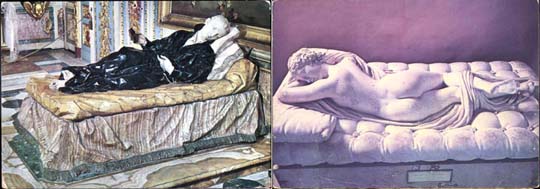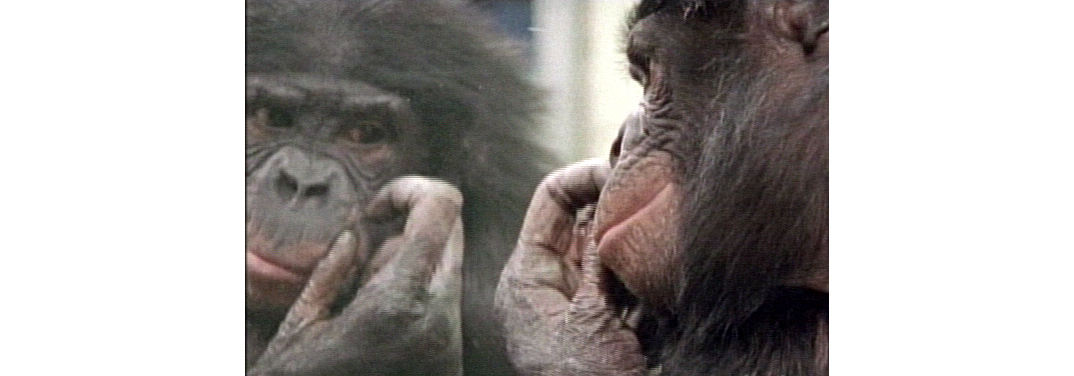"The negative construction of ....others is finally what founds and sustains European identity itself." (Hardt and Negri) For Hegel, the effort to overcome the Other is simultaneously an effort to overcome self- consciousness' own otherness to itself. Hegelian negativity simultaneously restored and systematized, unleashed and bound the power of the Other, against and within the consciousness of the Same. In the work of self-consciousness, which is desire in general, the subject finds ways to integrate what at first seems to lie outside itself. But during the ongoing course of this process, the subject changes, to the point that the subject can be considered only a term for the process that it accomplishes.
Read Moresubject
attention
Attention, according to William James, is "the taking possession by the mind, in clear and vivid form, of one out of what may seem several simultaneously possible objects or trains of thought." Any model of attention must account for its selectivity, for the fact that, after an animal learns a skill, it becomes automatic (or unconscious), for the ability to interrupt automatic acts by attention to novelty, and for the ability to direct attention specifically by conscious means. (Edelman)
Read MoreHanna Wilke from IntraVenus
body image
Two English neurologists, Lord Russell Brain and Henry Head (!) coined the phrase "body image" for the internal image and memory of one's body in space and time. The body-image mediates the mind / body polarization. It requires input from both sides to be effective.
Read Morebody

Aristotle distinguished between the body and the soul. The latter referred not only to the principle of life, but to the form of a particular living body. Thus the soul is the organization of the body. (cf. organism) Aristotle rejected the doctrine of the Pythogoreans, according to which the soul can clothe itself in different bodies. (see clothing/garment ) Instead, a particular soul is the entelechy, or formative force of a particular body, and the individuality of a particular man. Thus every particular soul requires a connection to a particular organic whole. At the same time, he upheld a division between matter and form which describes, for example, the relation between the eye and sight. When the power of sight is absent, the eye is no longer an eye in the proper sense. After taking the position that "..there seems to be no case in which the soul can act or be acted on without involving the body," Aristotle goes on to suggest that thinking is the one specific activity of the human soul which is capable of separate and independent existence from any connection to the body. (see also subject )
Consumerism
"When the going gets tough, the tough go shopping."
Consumerism is an acceptance of consumption as a way to self-development, self-realization, and self-fulfillment. It makes a clear separation between producers and consumers. In a consumer society an individual's identity is tied to what s/he consumes. People living in consumer cultures have a tendency to satisfy social, emotional, and spiritual needs with material things.
For critics of consumerism, such as Zygmunt Bauman (Consuming Life), “the consumerist society has to rely on excess and waste” (p.38) The advent of consumerism augurs the era of ‘inbuilt obsolescence” and the insatiability of needs. New needs need new commodities; new commodities need new needs and desires, and this dynamic makes individuals wish to do what is needed for the to enable the system to reproduce itself. Thus consumption is a “hedonic treadmill” (p.45). Its promises of satisfaction remain seductive only as long as the desire stays ungratified.
Read Morecritique of Judgement
For Kant, The power of judgement is a mediating element between (theoretical) understanding and (practical) reason, between concepts of nature and concepts of freedom (natural philosophy and moral philosophy, the sensible and the supersensible), between the is and the ought.
Read Morecyborg
Is the cyborg an improved hybrid species that has the capacity to be humanity's evolutionary successor? This is the starting point for Manuel DeLanda's evocation of future "robot historians" writing the history of " War in the Age of Intelligent Machines." Warfare has been the primary arena for the technological development of cybernetics, but the cyborg has become a figure that brings toget her science fiction and technology in unexpected combinations. If the Terminator and Robocop exemplify some of the issues of aggression for a masculine image of the cyborg in the contemporary imagination, the concept has been developed in a feminist perspective as well.
Read Morediscourse
In proposing to examine the general economy of discourses on sex, Michel Foucault states his objective of defining "the regime of power - knowledge - pleasure that sustains the discourse on human sexuality in our part of the world." (p.11) For Foucault, "the 'economy' of discourses -- their intrinsic technology, the necessities of their operation, the tactics they employ, the effects of power which underlie them and which they transmit -- this, and not a system of representations, is what determines the essential features of what they have to say." (p.69)
Read Moreego

what is the relation between the ego and the subject? According to Freud, the ego is an agency of the psyche,by means of which the subject aquires a sense of unity and identity, "a coherent organization of mental processes." (XIX,17.) Through consciousness , the ego is the site of differentiation between inside and outside, between "subjective" and "objective." The passage from the ego as biological individual to the ego as an agency: "such is the entire problematic of the derivation of the psychoanalytic ego . " (Jean Laplanche, Life and Death in Psychoanalysis, p. 76)
Read Moreidentity
According to Freud, the ego is an agency of the psyche,by means of which the subject aquires a sense of unity and identity, "a coherent organization of mental processes." (XIX,17.) Through consciousness, the ego is the site of differentiation between inside and outside, between "subjective" and "objective."
First page of Robert Fludd's Ars Memoriae 1619, showing the "eye of the imagination."
imagination
For Aristotle, in De anima, imagination is the intermediary between perception and thought. The perceptions brought in by the five senses are first treated or worked upon by the faculty of imagination, and it is the images so formed which become the material of the intellectual faculty. (Yates, p 32) Hence "the soul never thinks without a mental picture."
In the eighteenth century, "Fancy" or "imagination" applied to non-mnemonic processions of ideas. When images move in the mind's eye in the same temporal and spatial order as in the original sense-experience, we have "memory" This relation between imagination and memory follows Aristotle as well, for whom memory is a collection of mental images from sense impressions of things past. How do we distinguish between our own memories and our imagination? Modern researchers focus on "source memories" -- where and when we experienced something. Memories are generally accompanied by source memories, while imaginative thoughts do not have the same contextual components in time and space. But the loss of source memories or the imagined sense of location in time and space that can accompany dreams or vivid fantasies can make us unable to distinguish between memory and imagination.
Coleridge distinguished fancy from imagination, paralleling his distinctions between mechanical and organic. His theory of fancy singled out the the basic categories of the associative theory of invention: the elementary particles, or "fixities and definites" derived from sense, which he distinguished from the units of memory only because they move in a new temporal and spatial sequence determined by the law of association, and are subject to choice by a selective faculty -- the judgement of eighteenth-century critics. (Abrams, Mirror and the Lamp, p 168. Coleridge Bigraphia Literaria chapt. 13)
As opposed to this "aggregative" mechanical combinatory, Coleridge developed an organicist theory of the imagination, which is modifying and "coadunating." (a term from contemporary biology meaning to 'grow together as one.') He described the imagination as "vital" as "generating and producing a form of its own," whose rules "are the very powers of growth and production." For Coleridge, the imagination is "that synthetic and magical power, which reveals itself in the balance or reconciliation of opposite or discordant tendencies." This faculty "dissolves, diffuses, dissipates, in order to recreate; or where this process is rendered impossible, yet still at all events it struggles to idealize and unify. It is essentially vital , even as all objects (as objects) are essentially fixed and dead."
Thus the free play of the creative imagination makes up its own rules as it goes along and sets them according to the nature of the subject and the inspiration of the poet. "Imagination is no unskillful architect", for "it in a great measure, by its own force, by means of its associating power, after repeated attempts and transpositions, designs a regular and well-proportioned edifice." (Gerard, Essay on Genius, 1774) The "architectonic" impulse of the theoretical imagination renders phenomena intellectually manageable by presenting them in a "corrected fullness." (Sheldon Wolin).
The products of imagination Coleridge adduces most frequently are instances of the poet's power to animate and humanize nature by fusing his own life and passion with those objects of sense which, as objects, 'are essentially fixed and dead.' (Abrams Mirror and the Lamp, p 292) M. S. Abrams points out that almost all examples of this secondary or 're-creative' imagination would fall under the traditional headings of simile, metaphor, and (in the supreme instances) personnification.
"What distinguishes the worst of architects from the best of bees is this, that the architect raises his structure in imagination before he erects it in reality." Karl Marx, Grundrisse
"Imagination is an act by which we mentally simulate something that previously existed as a vague content of our sensation as sensuous, concrete form. If we then apply the same word to abstract thoughts, we thereby imply that these too are accompanied by mental images. " (Robert Vischer, "On the Optical Sense of Form," 1873) For Robert Vischer, the artist's imagination reunites the senses and the soul. "Both, in fact, were originally one, but in the course of its development the intellect placed itself in opposition to the senses, and only the artist succeeds in achieving their reunion." (p116)
For Kant, the imagination,(Einbildungskraft ) as a productive faculty of cognition, is very powerful in creating another nature, as it were, out of the material that actual nature gives it. Imagination is the faculty of mind which enables us to combine representations. (see Critique of Judgement sect. 49. see also intuition.) Using the etymology of Bild, one can say that the imagination synthesizes the manifold of intuition into a tableau-like unity, and Kant assigns an essential role to the imagination in synthesizing the disparate mental realms of sensibility, understanding, and reason. (See Gasché , p 217) Yet for Kant, the imagination is unequal to the ideas of Reason. The experience of the sublime, either in the form of magnitude or power, causes a painful awareness of the inadequacy of the imagination, but for a rational being there is a pleasure in this awareness, a harmony in this contrast. (see sect. 27) Kant uses the German word das Erhabene, which can mean raised, embossed, or lofty.)
Freud, too, stressed the inadequacies of the imagination, which he described as "the over-accentuation of psychical reality in comparison with material reality." (Das Unheimliche , p.244) In his descriptions of the uncanny (unheimlich ), Freud observed a weakening of the value of signs, in which the symbol ceases to be a symbol and "takes over the full functions of the thing it symbolizes." For Freud, this assertion of "the omnipotence of thought" requires the invalidation of the arbitrariness of signs and the autonomy of reality as well, placing them both under the sway of fantasies expressing infantile desires or fears. (Kristeva, p. 186)
For Gilles Deleuze, imagination is a circuit between the actual and the virtual. Imagination means how we see and how we learn to see, how we suppose the world works, how we suppose that it matters, and what we feel we have at stake in it.
In a very different context, Arjun Appadurai describes the joint effects of media and migration on the work of the imagination as a constitutive feature of modern subjectivity. This is a collective imagination, not the faculty of a gifted individual, and it forms the basis for a "community of sentiment." (what anthropologists call a sodality) Here Appadurai follows Benedict Anderson's analysis of the modern nation as "an imagined political community." For Anderson, "it is imagined because the members of even the smallest nation will never know most of their fellow-members, meet them, or even hear of them, yet in the minds of each lives the image of their communion." (Imagined Communities, p. 6) Appadurai describes media and migration as resources for experiments with self-making in all sorts of societies, for all sorts of persons. The mobile and unforeseeable relationship between mass-mediated events and migratory audiences defines the core of the link between globalization and the modern. In this context, the work of the imagination is neither purely emancipatory nor entirely disciplined, but is a space of contestation in which individuals and groups seek to annex the global into their own practices of the modern. (p.4)
(see also public / private)
For Appadurai, "The imagination is today a staging ground for action, and not only for escape." (an expression which should gratify those whose slogan in 1968 was "l'imagination au pouvoir." ) He describes "culturalism" as a mobilization of identities consciously in the making and as the most general form of the work of the imagination.
intersubjectivity
Intersubjectivity is a "deliberately sought sharing of experiences about events and things."
The primary model of intersubjectivity is " affect attunement" in the mother-infant dyad and the "holding environment." (see psycho-sexual space )
mirror

In the tenth book of the Republic, Socrates differentiates the maker of an object, such as a bed, made in accordance with the Idea of the thing (this is its eidos or form) , from the artist, proceeding in a quick and easy fashion, as if using a mirror. But "What should a painting be called," asked Alberti, "except the holding of a mirror up to the original as in art?"
Read Moresubject
At issue within the philosophical tradition is the relation of the subject to thought. (see also consciousness ) Ever since Aristotle the nous had been separate from the psyche. "At the moment of its manifest emergence in the Cartesian formulation, the subject is not in fact a psychic reality, but a pure Archimedean point." (Giorgio Agamben, Infancy and History)
Read More
